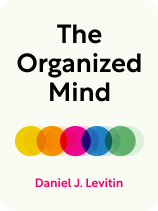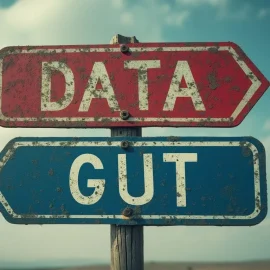

This article is an excerpt from the Shortform book guide to "The Organized Mind" by Daniel J. Levitin. Shortform has the world's best summaries and analyses of books you should be reading.
Like this article? Sign up for a free trial here.
How should you deal with our modern influx of information? Are there efficient ways to keep, process, and use information?
Your brain can handle only so much. To compensate for this limitation, neuroscientist Daniel J. Levitin recommends that you create systems to categorize information and store it outside of your brain. That frees up your brain to be more creative and productive.
Here’s Levitin’s advice on how to deal with information overload.
How to Deal With Information Overload
Levitin believes that multitasking is impossible and that storing information in your head is problematic. His advice on how to deal with information overload addresses mental resources. He advocates conserving these resources so that you have more brain power and energy to deal with the decisions that matter. You can do so via categorization (sorting) and externalization (storing information outside your brain by writing it down).
| Other Ways Externalizing Information Can Help You Like Levitin, Building a Second Brain author Tiago Forte asserts that the best way to deal with our modern influx of information is to externalize it. However, Forte argues that you should do so not to avoid decision fatigue, but because externalizing information improves your ability to do knowledge work—creating, interpreting, and applying information—which he contends is your most valuable asset in today’s society. Your ability to do knowledge work hinges on how creative and productive you are; building an external storage system in which you store every important idea you encounter in an easily accessible way increases both. But if you don’t externalize information, you can’t remember all the ideas you encounter, which reduces your creativity (ability to draw connections between ideas) and your productivity (ability to quickly access information). |
Sorting Into Categories
According to Levitin, one way to preserve your brain power is to take advantage of your natural tendency to sort, meaning classifying things into groups by function, appearance, or situation. This tendency helps you preserve your mental resources by allowing you to focus on only the most salient details at any given moment instead of juggling several bits of information in your head at once.
For example, you could sort your dinnerware by function: You can designate one shelf for bowls and another for plates. You could also sort them by color, with white dinnerware on one shelf and those with patterns on another. And lastly, you could sort them by situation: dishes for the family on one shelf and dishes for when guests come over on another. Doing so saves you from having to figure out where to find each dish you need when setting the table.
| How Sorting Helps People With ADHD Sorting may be especially beneficial for people with ADHD, who are likely to spend too much time making decisions and thus may use even more brain power. However, this tendency extends to the creation of categories; people with ADHD are more likely to create so many categories (that focus on non-salient details) that they stop being useful. For example, they might split the bowl shelf into soup bowls and cereal bowls—even though they regularly put cereal in all their bowls. To combat this tendency, people with ADHD should consider enlisting a friend’s help when creating categories or setting a time limit on how long they’ll spend creating categories. Sorting also helps people with ADHD deal with large amounts of information they’ve stored in the physical world; people with ADHD sometimes write long to-do lists but never do anything on them because they don’t know where to start. In this case, sorting things by importance or by deadline (rather than function, appearance, or situation) can help them decide what to do and improve their productivity. |
Storing in the Physical World
Another way to preserve your brain power is to store information in the physical world rather than in your brain. Sometimes, this storage process occurs before the sorting process. For example, if you’re trying to decide whether to buy a computer, you might externalize all the relevant features of the computer (by writing them down) so that you can sort them into “pros” and “cons.” Since you don’t have to remember every relevant feature, you now have more brain power available to focus on deciding whether to buy the computer
Other times, you store after you sort. For example, you might sort all your pencils and rulers into the category of stationery, then externalize this category by collecting all of them in a single drawer. This reduces the amount of information you have to remember: You no longer have to remember where you keep every pencil and ruler you own; you only need to remember that you keep stationery in a drawer and that both pencils and rulers count as stationery.
(Shortform note: In The Life-Changing Magic of Tidying Up, Marie Kondo emphasizes the importance of sorting all your things before storing them when organizing your home. Kondo notes that many people organize by room; however, she argues that doing so leads us to do the same type of work over and over again, which leads to burnout. Instead, Kondo recommends tidying by category so that you do one kind of work in totality, no matter where the objects are in your space. For example, instead of first organizing your clothes from the bedroom closet and then tackling your clothes from the hall closet, gather all your clothes from the whole house, eliminate what you don’t love, then store the rest.)
One effective way to externalize information is by writing down tasks you don’t need to deal with at the moment. By doing so, you free up mental space so that you can focus on the task at hand. For example, if you’re thinking about doing your laundry and thus not focusing on an important conversation, writing “do laundry” in your calendar releases this task from your brain so you can focus on your conversation. And now you don’t have to remember “do laundry” as an individual item; rather, you just have to remember “check your calendar”—because now the laundry is one of many things on your calendar.
(Shortform note: Tasks you want to accomplish someday but don’t need to do immediately are essentially short-term goals, and studies show that writing down your goals increases the chances you’ll achieve them. This is because writing something down increases the chances that you’ll remember it—both because you can now access it in an external format and because your brain is primed to remember information you personally create, and it treats writing something down as a form of creation. In turn, the more easily you can remember your goals, the more likely you are to achieve them.)
Sorting and Storing Increases Creativity
Levitin asserts that, in addition to helping you keep track of your life, sorting and externalizing information can also improve your creativity for two reasons. First, when you work in a well-organized environment, you know exactly where everything is. As a result, you don’t spend time on the stressful task of searching for things you need and are thus able to reduce your stress levels and save your brain power for creative thinking.
(Shortform note: Contrary to Levitin’s assertion that clutter harms creativity, studies suggest that clutter may improve creativity. One theory posits that messy places signal your brain that it’s OK to generate more unique, out-of-the-box ideas.)
Second, sorting and externalization improve your creativity by allowing you more opportunities to browse. When you look through a collection of some type (such as a group of files), your brain reverts to MW mode. Often, this mind-wandering leads to a creative insight—which might help you solve an issue you’ve been facing.
| Why Browsing Leads to Creative Insight In Hyperfocus, Chris Bailey elaborates on why browsing might lead to creative insight. We naturally remember things we haven’t yet completed much better than the things we’ve completed—so when you’re mind-wandering, your brain subconsciously works on problems it hasn’t solved by connecting all the stimuli it encounters to your problem. Sometimes, the stimulus your brain encounters reminds it of something else it already knows. It connects this old information (or the new stimulus, which may itself be the information you were missing) to your problem—and solves it. For example, Greek mathematician Archimedes reaped the benefits of browsing while he was in the bath. He was tasked with determining whether the king’s crown was made of gold, but he didn’t know how to solve this problem—until he switched from focusing on the problem to taking a bath and noticed that water splashed out of his tub when he got in. He realized that immersing the crown in water to see how much water it displaced would help him determine its mass and therefore whether it was solid gold (he discovered that it was not). Browsing may maximize the possibility of encountering the stimulus you need for a creative insight: The more you browse, the more stimuli you encounter, and the greater the likelihood you will encounter the stimulus you need to gain your creative insight. |

———End of Preview———
Like what you just read? Read the rest of the world's best book summary and analysis of Daniel J. Levitin's "The Organized Mind" at Shortform.
Here's what you'll find in our full The Organized Mind summary:
- The key to living less stressfully in the modern world
- Why our current approach to dealing with stress doesn’t work
- Strategies for sorting and externalizing your thoughts, things, and relationships






